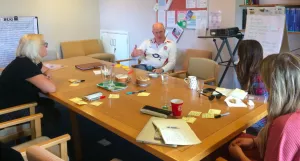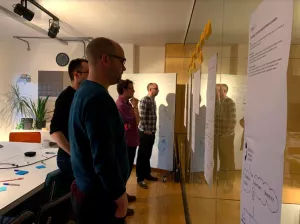Expanding research
We made the considered decision to focus our work on helping better prevent and self treat minor illness to avoid the use of GP time for these. But we soon realised we wanted to build a richer connection to people’s experiences and we could do this in parallel with beginning to consider solutions at a conceptual, high level.
GP reception staff at our pilot surgery had already painted us a picture of their daily challenges via interviews. We were fortunate to expand on this by shadowing their day, over two days, to gauge the demands of patients first hand and how they serve these. We were struck by the opportunities for operational efficiencies to manage more routine or administrative needs and that a drive to digitally enable patients was missing, something we suspect is common given the pressures on receptionists as it stands. It was also interesting to hear the variation in how people are triaged, which showed the personalised approach the reception team are proud to give.

There is a significant body of research quantifying the problem of GP use for minor conditions but we wanted to go deeper into why people see GPs for minor ailments and when and why people use other sources of support. We ran a survey to answer these questions. It told us that people generally access GPs when they feel symptoms have been going on too long, are concerned it’s more serious, and they want reassurance, even when symptoms were not severe. It showed us people are not consistent with self-care practices and interestingly only 20% of respondents were “ideal” self carers. In depth interviews unveiled that people tend not to receive self-care advice from GPs and pharmacists and online information is a source of anxiety and greater GP use, not something that helped avoid it.
Coming up with concepts
As we deepened our research we began concept ideation to design for self-care. How could we increase self-care and thereby reduce use of GPs? A sketching workshop and informal discussion with the design team at Clearleft generated many post-it note concepts, everything from wider community wellness, self-care kits, NHS footprinting and appointment tiering, to name a few. The idea at this stage was to think big and sketch fast.
Armed with post-its, sharpies and sketching icebreakers we took the design process to Henfield Medical Centre. We wanted to ensure any ideas of experienced staff were given a voice. It also ensured the pool of ideas was as diverse as possible and we felt it was helpful in creating a partnership approach in the project.

An intern team design studio gave us the space to individually generate ideas and share these. The research we ran alongside the ideation process identified other important opportunities so we included these problem areas in our sketches. A second sketching round allowed for the collective pool of ideas to be turned on their head, combined, and moulded into new forms. Having completed this we aggregated all the fantastic ideas and whittled these down to the most exciting concepts.
Using a workshop with Clearleft allowing for voting and open discussion, we narrowed our concepts down to three key ones, two on the patient side and one on staff side:
- Integrated self-care: Currently self-care provision in GP surgeries is inconsistent and outdated and surgery staff don’t signpost people to self-care. This concept is about designing for integrated, engaging and more personalized self-care support into the NHS primary care journey
- Self-prescribing: Although many people want to self-care, applying this to daily lives isn’t easy. Self-prescription would empower people to prevent and self-treat conditions using their daily routines and practices.
- Reception Insights dashboard: Front lines teams at Henfield Medical centre don’t have any insight into the trend in demands coming to the surgery. This means operational inefficiencies are not known and more interestingly, the changing medical demands not visible. This concept would empower staff to address inefficiencies and deliver targeted, more real-time community health improvements.

Empowering self-care
Using the insights from conversations with the team, Dr Sheppard and our own analysis we’re beginning to design how self-care can be better supported in daily lives. We’re excited to start developing this into something more tangible using our personas and storyboards.
You can follow us on twitter @clearleftintern for regular updates on the project.